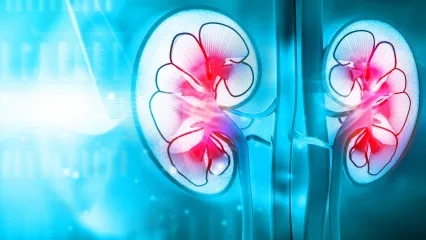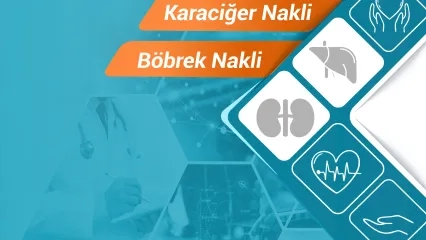Alo Yeditepe
Alo Yeditepe
Kidney Diseases and Treatment Methods
Internal Medicine and Nephrology Specialist Prof. Dr. Gülçin KANTARCI said that although kidney health is critical for the general functioning of the body, not enough attention is paid to it. Pointing out that kidney diseases, which are a problem of all ages, have become more important in parallel with the increase in diseases such as obesity and diabetes, she said, “Kidney diseases usually progress without symptoms. Therefore, regular controls are vital,” she said.
Yeditepe University Hospitals, Internal Diseases, Nephrology Specialist Prof. Dr. Gülçin KANTARCI said that although it varies according to societies, kidney disease is seen in 1 out of every 10 people and that kidney diseases have become widespread in our country in parallel with the increase in diabetes. “Stating that the slogan of World Kidney Day this year is “Are your kidneys good?” in order to direct the society to control their kidneys, Prof. Dr. KANTARCI made important statements.
Factors that cause Kidney Diseases
Stating that one of the most important ways to protect kidney health is to consume enough fluid, our expert said, “We need to consume fluids to remove toxins in our body and prevent obesity. Obesity is an important factor that negatively affects kidney health. In addition, it is necessary to consume fluids in order to remove the wastes of the drug from the body in people who use medication. Drinking at least half a liter of water a day is necessary for the kidneys to remove toxins and function properly. Ideally, it is recommended to consume 30 ml of water per kilogram of weight.”
Who Can Get Kidney Diseases?
Stating that kidney diseases can occur at any age, but the risk increases with age, our expert gave the following information about the risk factors related to the disease: “Type 2 diabetes, which is closely related to insulin resistance and overweight, is one of the most common causes. In addition, some genetic diseases that lead to kidney failure can also pose a risk. Especially genetic diseases can occur from the newborn period. Smoking, in combination with these factors, triggers kidney disease and causes protein loss in the urine. Kidney stones that are not recognized in time or not treated adequately are also an important cause of the disease. As the filtering power of the kidneys decreases with age, the risk of kidney failure increases.”
How Do Kidney Diseases Occur?
Stating that kidney diseases usually progress without symptoms and are not recognized until they reach an advanced stage, our specialist said, “Unlike other organ failures, kidney failure is usually not recognized until it reaches an advanced stage. Kidney disease is usually detected by chance while investigating another health problem.” She said.
Do Kidney Diseases Show Symptoms?
Reminding that the late appearance of symptoms makes the annual follow-up of people with chronic diseases even more important, our expert continued her words as follows: “In addition, long-term infections and treatments used for these infections can also affect the kidneys. Kidney failure may develop after medicated imaging methods such as tomography and angiography. Therefore, regular check-ups are essential. People with diabetes, high blood pressure, heart failure or cancer treatment should have a kidney scan at least once a year. Kidney health can be monitored with simple tests such as a complete urinalysis and serum creatinine measurement. These tests can be easily performed at family health centers.”
Kidney Transplant in the Treatment of Kidney Failure
Dialysis and kidney transplantation are the main options in the treatment of advanced renal failure “Hemodialysis and peritoneal dialysis restore some kidney function, while kidney transplantation restores all function. In hemodialysis, blood is removed from the body through a device, cleaned and returned to the patient. In peritoneal dialysis, a special fluid is injected into the patient's abdominal cavity, which is kept for a while and then returned with the waste. The amount of fluid is adjusted according to the abdominal structure and body volume. The ideal treatment is kidney transplantation, but dialysis plays a life-saving role until a suitable donor is found.”
Organ Donation Rates Should Be Increased
Pointing out that cadaver donation should be increased in Turkey, Nephrology Specialist Prof. Dr. Gülçin KANTARCI concluded her words as follows: “Kidneys from living donors or cadaveric donors can be used for transplantation. Cadaver donation should be increased in our country. Everyone may need an organ one day. For this reason, more importance should be given to social awareness on organ donation.”
About
Faculty and Year of Graduation:
Uludag University Faculty of Medicine 1984-1990
”
See Also
- What is Hypoglycemia?
- Common Misconceptions About Kidney Transplantation
- 10 Questions About Kidney Transplantation
- How Should the Daily Salt Consumption Amount Be?
- Misconceptions About Hypertension
- Chronic Kidney Disease and Treatment Methods
- What is Hypertension?
- Things Wondered About Kidney Transplantation and Organ Donation
- If You Consume More Than 5 grams of Salt...
- The Frequency of Hepatitis Seen in Dialysis Patients Is Decreasing
- 12-Year-Old Tuğba Nur Survived with Transplant
- Excess Protein Does Not Increase Muscle Mass, and It Impairs the Kidneys
- AV FISTULA Should Be Done At The Right Time For Hemodialysis Patients
- Pay Attention to Kidneys in Pregnancy!
- He Held On To Life with His Brother's Kidney
- Recommendations to Strengthen the Immune System
- Kidney Failure Caused by Ear Obstruction
- There is Still a Lot of Misconception About Organ Donation
- He Lost 20 Kilograms in 40 Days for His Wife
- One Out of Every Seven People Has Kidney Disease
- How Should Kidney Patients Be Protected From COVID-19 Coronavirus?
- What is Propolis? How to Use Propolis?
- Improper Nutrition Invites Kidney Failure
- Important Warning from the Expert: “Not Adding Salt to Meals Alone Is Not Enough”
- Tissue Harmony Is Also Important for Success in Kidney Transplant
- Phytotherapy and Immune System
- Hereditary Kidney Diseases Are Underrecognized!
Alo Yeditepe






